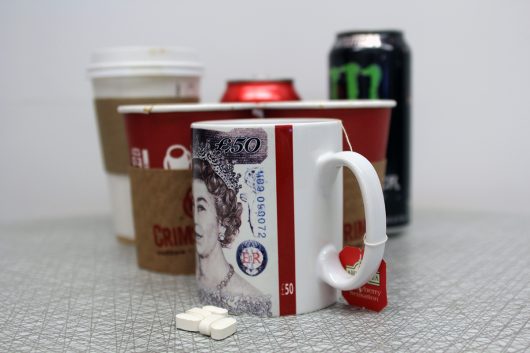
Janele Bayless, wellness coordinator for the Office of Student Life, recommended students consume no more than 300 milligrams of caffeine each day. Credit: Cameron Carr | Lantern Reporter
A daily caffeinated beverage, or four, is a routine for many students. And it might not be that bad for one’s health.
Mary Kay Pohlschneider, instructor of the caffeine science online course, said there are benefits to caffeine. It pushes adrenaline and increases heart rate, which helps with blood flow.
She cited the recommended limit as about 400 milligrams a day. According to the Mayo Clinic, a regular 8-ounce cup of coffee has 95 to 200 mg of caffeine, and a shot of espresso has 47 to 75 mg. Black tea has 14 to 70 mg, green tea has 24 to 45 mg and a can of Monster Energy drink has 160 mg.
As part of the class, students track their caffeine consumption for five days and try to abstain for two days. Pohlschneider said she was surprised by the number of students who say they do not consume caffeine, but still take the course. However, most of them consume caffeine regularly.
“For the most part people said ‘Yeah, I consume a lot, but I’m okay with that,’” Pohlschneider said.
People can build up a tolerance to caffeine, but cannot technically get addicted to it, Pohlschneider said. Caffeine blocks adenosine receptors in the brain, which tell us we need to rest. With frequent caffeine consumption, the body creates more receptors over time, causing a need for more caffeine to achieve the same level of energy. While there are physical withdrawal effects, caffeine doesn’t light up the certain points on the brain to constitute a clinical definition of addiction, she said.
“Yes, we do have some physical addiction properties,” Pohlschneider said. “Anybody that drinks a lot of caffeine, and then stops, can tell you about the headaches and grumpiness.”
Janele Bayless, registered dietitian and wellness coordinator for the Office of Student Life, said she recommends limiting caffeine intake to 200 to 300 milligrams a day. She said anything more than that can make students feel jittery and, depending on how late in the day they have it, have trouble sleeping well.
Pohlschneider said tea and coffee are better choices than soda, energy drinks or pills. Tea and coffee have antioxidants, while soda and energy drinks tend to have a high amount of sugar.
She sees caffeine pills as especially dangerous because a person could easily take too many without immediately recognizing the effects. Just like with shots of alcohol, it is easy to overdo it by taking too many in a short period of time, she said.
“Overall I think caffeine is not harmful, that everybody is going to act a little differently to it,” Pohlschneider said. “The biggest thing that I would tell people is, pay attention to the way your body reacts to it.”
Bayless said a more holistic approach is important to maintaining energy levels, like getting enough water and food throughout the day. Exercising can help boost energy levels and ensure a good night’s sleep, she said.
“It’s not that people can’t have a caffeinated drink, I would just recommend limiting the amount and making sure they’re looking at the holistic picture of health and well-being, of making sure they’re getting enough sleep and physical activity and nourishment,” she said.

![Local fashion experts guide college students through shopping and dressing for their upcoming summer jobs or internships. Credit: Dreamstime (via TNS) [Original caption: How does smart casual differ from snappy casual, glitzy casual, dressy casual, party casual and business casual?]](https://www.thelantern.com/files/2024/04/LIFE-FAM-BORGMAN-COLUMN-DMT-7432064dd4242c4c-384x253.jpg)
